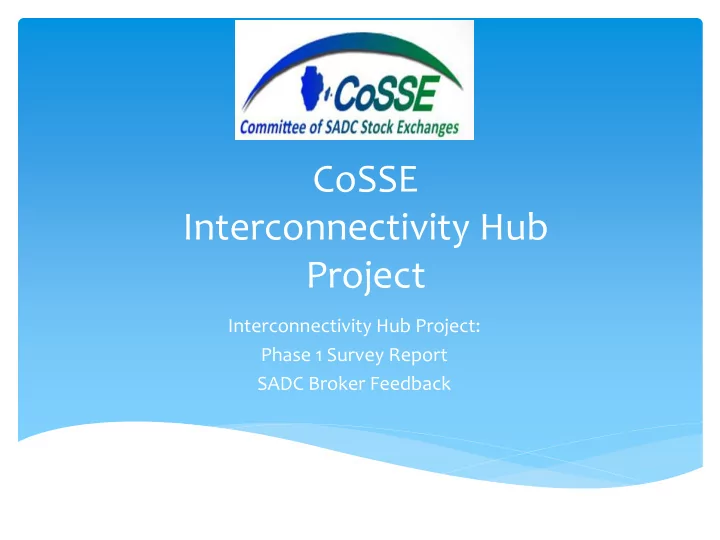

CoSSE Interconnectivity Hub Project Interconnectivity Hub Project: Phase 1 Survey Report SADC Broker Feedback
Background The creation of a formal Stockbroker’s Network Database, which will allow for information sharing between broker’s in the SADC region. Investors in 1 part of the region will be able to buy or sell shares listed on another SADC exchange, through their counterparty broker in another member country The SADC Exchanges will agree on a standard counterparty contract that will be signed by all stockbrokers who wish to be included on the database.
Survey Feedback
Do you trade other African stocks? Most firms indicated that they DO NOT trade other African stocks on their exchange due to the following reasons: Lack of demand from their clientele No relationships with other African Stockbrokers Prohibitive regulation – prohibition against foreign investment in the Pensions Act (Zim) Lack of accessibility and exposure to said markets Lack of infrastructure- automation Lack of interest from clientele Cost of execution might entail increasing costs Tight controls from central bank, lengthening turnaround times which causes trading times to be lost Limited access to foreign capital markets and Currency Risk Company’s lack of risk appetite for local stock
What would you require, in order to trade other African stocks? Regulation Concerns 1. Stability & reassuring regulatory environment 2. Regulation Amendment for Pension & Provident Fund 3. Agreements for the terms of trade, covering performance charges; currencies; insurance 4. Market transparency 5. Viable structure and proper regulation 6. Relaxed foreign exchange controls for investment and divestment Market Concerns 1. Interest and demand from clients 2. Market visibility, awareness of the listed universe 3. Clients to complete KYC process 4. Market Liquidity Settlement Concerns 1. Efficient Execution 2. Fast Confirmation 3. Safe and secure settlements 4. A platform to trade with moderate transaction costs Information Concerns 1. More information regarding trading rules across the region. 2. Research done by participating brokers 3. Robust communication among brokers.
Concerns regarding the Interconnectivity Hub initiative Clearing: Recommended to use global clearing houses Reliable and guaranteed CDS Information available on current CDS access Common settlement cycle Flexible, centralised and harmonised clearing controls and legislation / policy Back to back agreements in place between the continental CSDs and local CSDs All exchanges to have electronic settlement systems in place
Concerns regarding the Interconnectivity Hub initiative cont … Cost to brokers Fee sharing between brokers Would brokers need to pay for interconnection / who will bear the cost of interconnectivity on inter stock transactions? How will the clients costs be shared/transferred between brokers – what will be the additional charges to clients (if any)? What implication will that cost bring in terms of investor excitement and subsequently, participation on the stock market? Cost of acquisition of additional infrastructure Cost/s to be unified and standardised across countries The markets should move towards homogeneity with regards to logistics, trading rules, procedures and costs How does the benefits exceed the costs? Technology in other countries is not advanced, who will be responsible for the development costs of the markets? Costs for brokers to setup the linkage to either the hub or exchange – what would the trading costs be (if any)?
Concerns regarding the Interconnectivity Hub initiative cont … Additional regulations for brokers Compliance risks when dealing with brokers that are operating in non-equivalent jurisdictions Bulk order acceptance Enhanced due diligence required on every single underlying client prior to trading approval Regulatory authority and standardisation of rules - harmonisation and synchronisation of existing regulations in the countries is very important Will additional regulations be imposed upon brokers? Satisfaction with existing dual listing regulations Legal recourse in cases of disagreements/conflicts is required Will the interconnectivity hub be the governing body for market rules and regulation as the exchanges differ in rules?
Concerns regarding the Interconnectivity Hub initiative • Other Concerns • SADC markets are small in size, how would the interconnectivity hub improve liquidity? • Political risk concerns in some of the countries. • Are all exchanges on electronic settlements? • Fiscality and taxation on trades done in foreign assets versus local assets, how it impacts profitability for local versus foreign clients. • Foreign Exchange Controls and availability of foreign currency in order to clear the trades in foreign currency. • Different settlement cycles across markets • Exchange control • Taxes on dividends • Taxes on capital gains • Foreign Exchange controls • Trading System • Trading hours • Possibility of cannibalisation of clients by foreign brokers having access to local clients
General Comments • Where would the settlement of shares be? • Which currency would be in use for settlement? • Questions regarding the location of the securities depository • Would the hub itself be an exchange or forum/body? • What are the project timelines? • Collection of information between markets participants should be balanced • CoSSE (Committee of SADC Stock Exchanges) and it’s member exchanges could establish and agree on basic legal matters concerning the trading to avoid conflict between stock exchanges, and establish MoUs with partner exchanges • Fee/ cost structure for valuable and successful implementation must be considered.
Recommend
More recommend